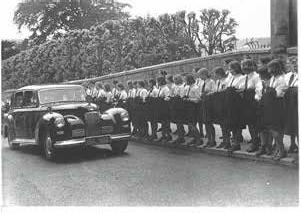
11 minute read
Obituaries
A Glance at the Past
Seventy Years Ago… September 1950 1950 also saw the start of the return to the was the 75th Anniversary of the founding rebuilt Hope House for the Sixth Form down of Bath High School, the first GPDST to IV Upper (the equivalent to today’s Years (GDST) school outside of London. Birthday 13-9). celebrations were held and presents bought for the different parts of the School, including a Grand Piano for the Seniors and a Wendy House for the Juniors. The Old Girls Guild (OGG) held a dinner at The Red House The culmination was a grand opening by the Duchess of Gloucester. The OGG presented an elegant Georgian table to complete the splendid entrance hall to Hope House. ALUMNAE THE and one of the original pupils was able to attend. Do let us know if you were there! Pam Gooding (BHS 1955)
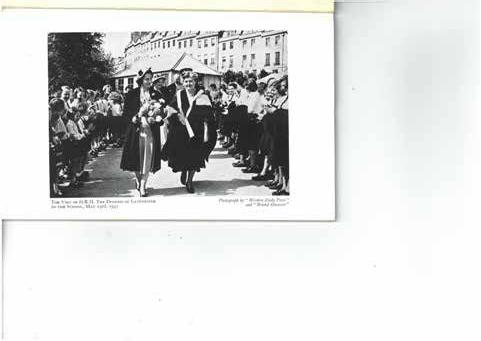
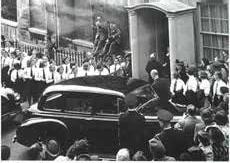
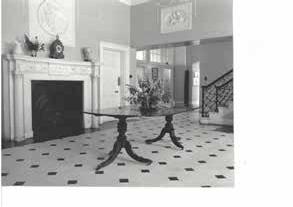
Obituaries
Mrs Aileen Eyers (BHS alumna, parent and former History teacher)
9 December 1923 to 30 August 2020
Mrs Aileen Eyers taught Scripture and British Social and Economic History at Bath High School from 1968 until the late 1980s. She was the Librarian, before this became a post in its own right and was also the Head of Middle School, the first 3 years of the Senior school, being known affectionately by the girls as Ma Eyers because she would always help find lost property and later as Grandma Eyers. Aileen lived for 63 years in the village of Corston, near Bath, where she and her husband Bruce built their home in an orchard with views of Bath. Aileen lived the last 3 years of her life at Mavern House nursing home in Shaw, near Melksham until her death on 30 August 2020. Aileen was born in 1923 in Glasgow, where her father worked at The Clyde Shipping Company and her mother was a junior schoolteacher. She was educated at Paisley Grammar School and Glasgow University where her degree main subjects were History & English and subsidiary subjects were Geography, French and Education. Her teacher training was at Jordan Hill College and she also studied for a Scottish Bishops Diploma for teaching of Religious Knowledge. Aileen met Bruce when they were both on the national committee of the Anglican Young Peoples Association and after their wedding in Paisley she moved south to be with Bruce in Bristol. Her first teaching post was at East Bristol Secondary Commercial School which later became Rose Green High School and was where Aileen held her first Head of Department post. She took a break from teaching in 1957 to bring up 5 daughters and then to foster several children on a short-term basis and she was also a voluntary social worker through the WRVS until returning to teaching, at first in a part-time capacity in 1966 and then full time at Bath High School from 1968. Aileen enjoyed traveling extensively in Europe and Scandinavia with Bruce and her family and after she was widowed, she enjoyed many cruises to her beloved Norway. Her hobbies included embroidery, tapestry, gardening and music. Aileen was a woman of great Christian faith and she became an Oblate of the Sisters of the Love of God based at Fairacres Convent in Oxford in the early 1980s. She visited several times a year and joined in the life of the resident community in their rhythm of prayer and contemplation. Above all Aileen’s interest was in children and in helping them to thrive and to achieve their potential. She is missed greatly by her family and friends. Mark Golder, Senior Teacher at RHS, reminisces ‘Ah, it comes flooding back. I took over from Aileen in 1986. She was known by the staff as ‘God’, so I was ‘Godlet’. Simpler times: her capitation advice to me for 1987 was £5 for chalk. Her son-in-law taught Music at the school for several years – some of the musicians might still come across him on the circuit – Michael Cockerham.’
Susan Angela Wheadon, nee Bridge (BHS 1947-1960)
10 July 1942 – 23 August 2020
Susan died peacefully at home cared for by her devoted husband after a short but cruel illness. Sue attended Bath High School throughout her education, starting at Beechen Cliff as an infant and continuing until the Upper Sixth. School was a very important part of her life where she developed particular interests in natural history and geography. She had a pleasant singing voice, being a member of the Madrigal Choir and singing for the marriage of Margaret Dewey. She always wanted to teach and began helping Miss Higgins in the Junior School while studying ALs. After teacher training at what was Maria Grey College in Roehampton, she had a long working career in infants teaching, mainly in an inner-city school in Bristol. After retiring she continued her longstanding interest in children’s music by involvement in the administration of the annual Mid Somerset festival of music and drama in Bath. She developed a non-competitive event, the Primary Music day where local schools gathered to perform for and with each other. This was enjoyed by children and teachers alike and remains an innovative part of the annual programme. Sue loved choral singing and her home, garden and cats in Wick Nr Bristol. She is survived by her husband Tony and sister Ruth.
Elizabeth Hall, nee Fosbroke Hobbs, MBE (RS 1940s)
13 March 1926 - 29 March 2021
We were saddened to hear of the death of Liz Hall at the age of 95. Her daughter, Diana, wrote that her mother had very much enjoyed her time at the Royal School and often told Diana and her siblings’ stories of ghosts at Longleat and being on fire watch duty on the roof with sand buckets. Diana kindly shared with us the adjoining photo of her mother playing tennis at school together with the following tribute from the Andover Cricket Club: Liz’s involvement with cricket began, like so many of us, playing in the garden with her father. Liz always felt that her father had secretly wished for a son but being blessed with three daughters he set about their sporting education by creating a net in the back garden. Following her father’s death as a result of a plane crash (he wasn’t killed in the crash but when he went back into the plane to rescue those who were still there and the fuselage collapsed on him} Liz was sent to The Royal School, Bath, and it was here that her cricket began to flourish as the school had a very successful girls’ cricket team. After the Second World War Liz went to Liverpool University and was the driving force behind establishing a women’s cricket team who were coached by the West Indian international, Learie Constantine. Their fixture list included games against other universities across the north of England and frequently they had to have an overnight stay in a hotel. Learie Constantine had to stay in a different hotel; not only was he a man but also black. These things were not allowed in the early 1950s. When I spoke to Liz once about this period it was plain that she was offended by this. Learie Constantine himself was later to be knighted and eventually admitted to the House of Lords. It was whilst playing for Liverpool that she attracted the attention of Lancashire County Cricket Club’s women’s section and in due course she was invited to play for England and to go on a tour of Australia. Sadly, she could not take up the invitation to tour as, in a totally amateur sport, she would have to fund her trip entirely, a cost of £400, which equates to around £14,000 today. Her consolation was that the girls unable to make the trip were selected to play against those who could in a special game played at the Oval. I never did find out the result. Liz did not only play cricket her other sporting love was tennis and she represented Berkshire for several seasons often partnering the son of the founder of Waitrose in the mixed doubles. My first encounter with the Hall family was as a teacher at Harrow Way School. The arrangements for parents’ evenings in the 1970s were that all the teachers were allocated to rooms throughout the school, and one evening I was sharing a room with my best friend, Steve Foster, who was teaching Liz’s son, Robert, English at the time. Steve had made notes on every student concerning their aptitude, achievement and so on. As Liz and her husband, Phil, sat down for their interview Phil proved how adept he was at reading something that was upside down and said, ‘So, you think Robert needs a kick up the arse? Well, we agree.’ Whilst at Harrow Way Robert was to form the backbone of a formidable school cricket team along with Peter Aldridge and David Hacker. At the time Andover Cricket Club had begun an embryonic youth section through the efforts of Alan Ellwood and it was into this set up that Liz brought Robert to join. Of course, it wasn’t long before Liz was getting involved in running the youth section and overseeing its development into one that would become the envy of clubs throughout Hampshire.
Continued on page 23 u
The energy that Liz displayed in committing to this cause would have exhausted many younger people, it did me. Apart from teams across age groups beginning at 9yrs old and up to under 15s she would organise an annual cricket festival in the first week of the school holiday, which had games taking place in Andover every day of the week using both grounds, and in conjunction with Andy Hooper a youth league that ran during the school holidays. If ever you had to telephone Liz to ask about any of the arrangements for these games, she would never be in and any enquiry would be met by Phil saying that he had to consult ‘the computer’. The computer was a battered notebook kept by the side of the telephone with copious notes and instructions for Phil on how to respond on just about any eventuality that might arise. When she was in her mid-70s Liz organised a youth cricket tour to Holland. The somewhat more liberal approach of the Dutch meant that the older boys were allowed to have a beer after the game. However, when some of the hosts started to smoke substances that probably had not been produced by WD & HO Wills and they were inviting the Andover boys to join in Liz very firmly said to the captain of the home side, “It’s bad enough that we have 15-year-old boys drinking beer, perhaps we should draw the line at ‘special cigarettes.’” In 1985 I was captain of the 1st XI, in 1986 I became captain of the 3rd XI – I was appointed to both positions entirely on merit you understand. Liz, having qualified as an umpire, agreed to stand for us. It certainly had a marked impact on the language of the players and the reaction to decisions made. Her egalitarian approach to cricket and umpiring can be summed up in a story I was told by Ali Hooper. In a youth match he had been batting quite some time when a ball passed by the outside edge of his bat and was caught be the wicket keeper who half-heartedly appealed, and Liz give Ali out. Somewhat disgruntled Ali did say afterwards, “I didn’t hit it.’ Liz replied, “I know, dear, but, sometimes, we have to let others have a turn.” The Greek philosopher Plato said, “You can learn more about a person from an hour’s play than from a year of conversation.” That one exchange tells us so much of Liz’s view of sport and life. There will be hundreds of people who played cricket across not only Hampshire and the south of England but probably the whole of the cricket playing world whose life in cricket was given a start and encouragement by Liz Hall and who will remember with great fondness how they were treated. I hope those players will go on to pass on their experience to others starting in the game, for that is her legacy. A legacy of sporting activities played with great gusto, in the right spirit but ‘sometimes we have to let others have a turn.’
John Baxter, April 2021
The Andover Advertiser’s obituary for Liz Hall can be viewed at https:// www.andoveradvertiser.co.uk/ news/19218615.tributesmencap-founder-andoverstalwart-elizabeth-hall-mbe/
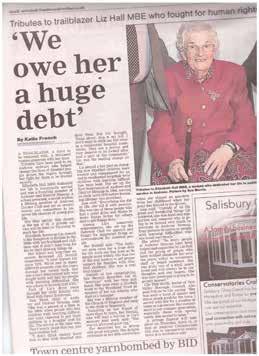
Jean L.M. Collard, nee Hill (BHS 1940-1949)
Jean sadly passed away in April at the age of 91 and was a pupil at Bath High during the 1940s. Her husband, Prof. Christopher Collard, recently wrote to Mrs Kate Reynolds, Head, explaining that she won a scholarship awarded by Bath City (of Somerset County) Council to be a day-girl; but Headmistress Gwen Blackburn soon perceived that Jean’s home background as an orphan was severely deprived in almost every way; and she persuaded the Trust to fund her as a boarder. Jean became Head Girl, and after Bristol University went on to career in sociological and marital research in London, with significant publications, and finally as a psychotherapist (for which she trained in Oxford during her sixties). Christopher and Jean married in 1966, both being then on the staff of Liverpool University. Prof. Collard added ‘you are of course aware of Gwen Blackburn’s distinction in preserving the School’s activities throughout WWII and its destruction by air-raid. She was a remarkable person in many ways, whom Jean admired and who maintained her affection for Jean throughout the rest of her life; it was a privilege for me to get to know her and to enjoy her friendship until she was cruelly cut down by heard-disease.’









